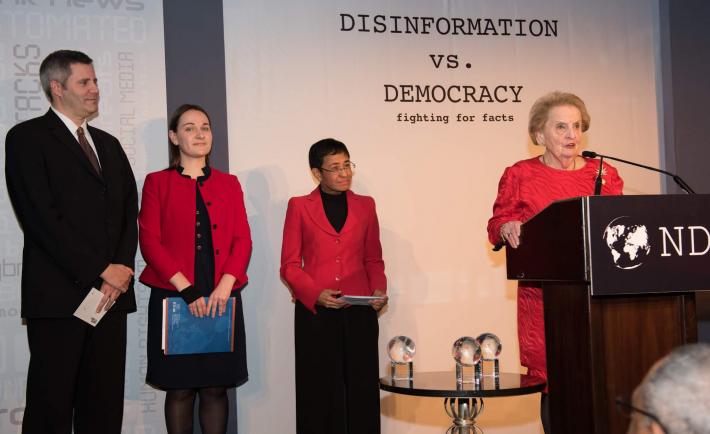
NDI 2017 Democracy Award recipients with (right to left) Secretary Madeleine Albright, Maria Ressa (Rappler), Margo Gontar (StopFake.org), Dr. Phil Howard (Oxford Internet Institute). Photo credit: Margot Schulman
Celebrating “women risk takers,” this video focuses on #DemocracyHero Maria Ressa, a veteran journalist and the CEO of Rappler, the leading independent online news network in the Philippines that has been at the forefront of combating disinformation and exposing human rights abuses under the administration of Philippine President Rodrigo Duterte. For their critical reporting, Maria and her fellow independent journalists have been indicted multiple times on questionable charges. Maria herself has been arrested twice. Maria’s courage has been globally recognized. Among many accolades, she is a recipient of NDI’s Democracy Award in 2017, and TIME magazine’s Person of the Year award in 2018.
Derek Mitchell: I'm Derek Mitchell, president of the National Democratic Institute. NDI—for more than 35 years—has worked with courageous and committed citizens around the world to support democracy and to underline human dignity. NDI works for democracy, and makes democracy work.
This month we are celebrating women risk-takers. Today we focus on Democracy Hero Maria Ressa, a veteran journalist and the CEO of Rappler, the leading independent online news network in the Philippines, that has been at the forefront of combating disinformation and exposing human rights abuses under the administration of Philippine President Rodrigo Duterte. For their critical reporting, Maria and her fellow independent journalists have been indicted multiple times on questionable charges. Maria herself has been arrested twice.
Maria, it is an honor to be your partner. Let me ask you: What is the greatest risk you've ever taken?
Maria Ressa: In Rappler, why do we continue to fight? I mean, fighting a government is not a joke, but I don't look at it as fighting a government. I look at this as just doing our jobs. We are journalists. Until the constitution is changed, we have certain rights that are guaranteed by the Philippine Constitution. And now more than ever in the Philippines, the Bill of Rights, freedom of the press, freedom of expression, human rights violations that are occurring on a near-daily basis—the groups and government forces that are doing this should be held to account.
DM: What message would you give to girls and young women who want to follow in your footsteps?
MR: Whatever you’re most afraid of, touch it—touch it, own it, hold it. And the power of that fear is gone. If you can conquer your own emotions but stay in touch with those emotions, I think that's a source of great strength. And you can see that in a lot of women leaders, and I think in a lot of male leaders who are not afraid to look “weak.” Emotion is not weakness.
DM: Finally, Maria, what would you consider the biggest threat to democracy today?
MR: How are we going to make sure that lies are taken out of the public sphere so that we can go back to the debates that democracy needs. In order to do that, we need old power and new power. New power needs to come up and understand how they disrupted the information ecosystem, and they're going to need to take the actual gatekeeping power seriously. They can't allow lies to stay in the public sphere, to grow, to be fanned by people with goals of using that for power. This is part of the reason you're seeing this growth of authoritarian-style leaders moving exponentially, globally. This is the biggest challenge we have today.
DM: As we remember World Press Freedom Day, let's shine a light for truth and applaud the work of Maria Ressa, Rappler and all others taking risks for democracy.
You can learn more about brave women risk-takers through our DemWorks podcast. Go to NDI.org.
